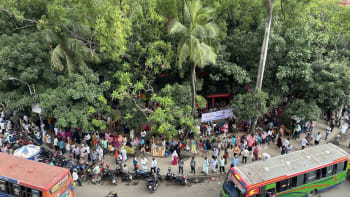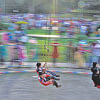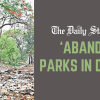Our lack of open spaces reinforces class disparity

Recently, I came across a news report announcing that one of the country's biggest real estate companies had undertaken a project to build a 500-foot megastructure in Dhaka, aiming to make it a landmark in the capital. I winced at first glance. The prospect of the project itself felt morally depraved. It seemed disconnected and dystopian, and it is. Not only does Dhaka not need a 500-foot skyscraper, but even in the context of its urban fabric, it doesn't fit in. But progress as a concept appears to be measured exclusively by murky indicators such as advances in commerce and the reaping of wealth. Moreover, the skyscraper holds the potential to attract more businesses, introduce more opportunities to invest in even bigger profit-maximising projects, and create spaces for the country's most elite to leisure in. Is that what we really need, though? And more importantly, how can such a project, which in all likelihood does not embody any aspect of our culture, become a potential landmark in the capital?
While the developers of the project have already begun selling commercial space within the vicinity, it's not like the skyscraper will mark the beginning of the end for commercial projects. Other high-rises will continue to be propped up, which will further limit the opportunity to build open spaces in the city. It is quite clear which group of people these projects will benefit, but what will be disregarded are its effects and the people who will bear the brunt of said effects. It will only aggravate the claustrophobic chaos of the capital that we live in—quite literally leaving us with no place to go.
With movement restrained, people, especially the younger demographic, are forced to resort to online spaces in search of a community. There is nothing inherently wrong with online communities, but it is a problem if that is the only means they have to meet new people. After all, online forums are unified by a common interest, which entails that their appeal tends to be reserved for certain demographics. Demographics tend to share similar and overlapping opinions and when the same views are regurgitated, it creates an echo chamber, affirming their biases. People are deprived of the opportunity to expose themselves to outlooks and ideas different from their own. The exchange of thoughts is leashed, if not completely contained, and groups of people continue to live in their own bubbles.
Without open space, these barriers cannot even be realised, let alone diminished. And the public spaces that we do have are either neglected or exclusive to upper-class neighbourhoods. Dhanmondi Lake, for instance, while housing visitors from adjacent residential areas, is grossly neglected. The smell in and around the area is unsavoury, to say the least. Additionally, it is situated in one of the most expensive neighbourhoods in the capital. While it is open to everyone, those who live around it are able to enjoy its benefits to a greater degree. The same may be claimed for Justice Shahabuddin Ahmed Park located in Gulshan—yet another area for the upper class.
The silver lining is that these places exist, but it does beg the question of whether open spaces are a luxury reserved only for the wealthy. If that is the case, which it might as well be, we should be asking whether these spaces are open to begin with. Is it any different to the cafes and restaurants that are open only to paying customers? Spaces which can only be accessed if one has the means to consume the commodities they have to offer? The distinction between a cafe and a park is that you need social capital to access all the benefits of the latter. And being open to only a select few is something that should frighten us all. In an essay titled "The Political Economy of Public Space," David Harvey talks about how urban renewal projects are developed with the aim of separating people who are in different socioeconomic brackets. These projects enforce a sense of order where the city is geared towards serving the upper class.
If people, regardless of their socioeconomic backgrounds, are not able to congregate in a space without being forced to spend money, it truly is dystopian. Open spaces aren't just essential for one's physical and mental well-being; it quite literally is a place for people to socialise. Without open spaces, we risk being more isolated, stifling the flow of ideas, and maintaining the very same order that has put us in this position.
DSCC Mayor Sheikh Fazle Noor Taposh once said they had taken initiatives to build playgrounds in every ward. He also acknowledged that doing so is a challenge due to a lack of space. It is admirable that change is happening, but it is a shame that the authorities themselves are having trouble with building open spaces for the reason that they attributed it to. Commercial projects never seem to face similar issues. As it stands, Dhaka already has an abundance of them—a lot more than it needs—most of which are poorly built to cut costs and have endangered lives.
Open space is antithetical to these projects. It allows us to slow down, unwind, and gather. Most importantly, it reinforces the spirit of community, and being a part of a group means caring for the needs and wants of each other. Something that appears to be in short supply from our elected representatives. In the pursuit of placing cosmetic global appeal within Dhaka, the authorities and corporations have forgone what we need locally. That needs to change. I don't know if it will. I am not particularly hopeful, but the welfare of the people needs to be prioritised over the greed of corporations and industries. If there is any tangible embodiment that can enable such a change to be realised, public spaces are it.
Abir Hossain is a sub-editor at Campus, Rising Stars, and Star Youth.
Views expressed in this article are the authors' own.
Follow The Daily Star Opinion on Facebook for the latest opinions, commentaries and analyses by experts and professionals. To contribute your article or letter to The Daily Star Opinion, see our guidelines for submission.

 For all latest news, follow The Daily Star's Google News channel.
For all latest news, follow The Daily Star's Google News channel. 







Comments